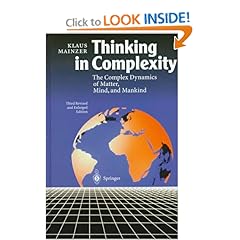 319084.rar
大小:(7.41 MB)
319084.rar
大小:(7.41 MB)
只需: 10 个论坛币
马上下载
本附件包括:
- thinking_in_complexity.pdf
Thinking in Complexity
by Klaus Mainzer (Author)
Hardcover: 361 pages Publisher: Springer; 3rd rev. and enlarged ed. edition (March 15, 2002) Language: English ISBN-10: 3540625550 ISBN-13: 978-3540625551 
Amazon.com Review
Chaos is cropping up everywhere these days. As it becomes ever more apparent that Newtonian mechanics is inadequate for modeling nonlinear systems, or systems that have too many degrees of freedom to handle easily, researchers in all fields are turning toward nonlinear dynamics as a refreshing alternative. This is a paradigm shift à la Kuhn, and Klaus Mainzer guides us through it with an astounding range of historical and scientific knowledge. From quantum physics to consciousness to economics, Mainzer shows us how thinking complexly can solve problems over which standard, linear thinking continually stumbles. Instead of simplifying, however, Mainzer revels in the complexity of complexity, so the reader should be prepared for advanced concepts in such varied fields as mathematics, physics, and economics. Difficult, but worthwhile reading. --This text refers to an out of print or unavailable edition of this title.
Review
From the reviews of the fourth edition:
THE INDUSTRIAL PHYSICIST:
"The science of complexity is likely to be among the most salient features of the 21st century, and Thinking in Complexity: Computational Dynamics of Matter, Mind, and Mankind is just as likely to be among the most popular introductions to the topic. Author Klaus Mainzer treats highly technical materials related to descriptions of complexity pervading science, engineering, and societal dynamics–and even ethics–with a lucidity that is sure to captivate physicists as well as the general public with a moderate scientific background. … Readers of this book will enjoy Mainzer’s exposition, which is based on a tight coupling between classical and historical concepts from Plato and Aristotle to modern, mathematical and physical developments, including relativity, chaos, and quantum physics. Every chapter begins with a section designed to orient the reader to the perspective of philosophical developments through the ages pertinent to the topic at hand. Readers patient enough to read through the lines will be rewarded with occasional gems such as Mainzer’s speculation on a possible correlation between a society’s development of atomistic ideas and its possession of a phonetic alphabet. The author takes pains to point out essential differences between classical science and the science of complexity. … Thinking in Complexity is an outstandingly readable book."
"This book is ambitious, incredibly erudite wih 22 pages of references, and is indisputably clearly and beautifully illustrated. It is perfectly suited to a first course on the science of complexity." (Physicalia 2005, vol. 57, page 191-192)
"All-in-all, this highly recommended book is a wonderful resource for intuitive basic ideas in the need of rigorous formulation." (Albert A. Mullin, Zentralblatt MATH 2004, vol. 1046, page 5)
[此贴子已经被作者于2009-5-22 15:46:18编辑过]

 扫码加好友,拉您进群
扫码加好友,拉您进群